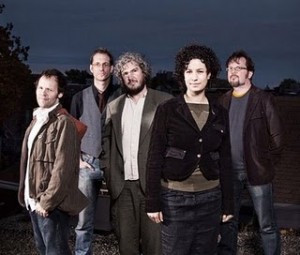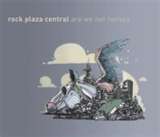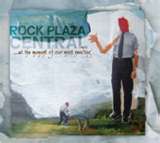 Captivating Toronto-based singer-guitarist Chris Eaton brings a refreshingly spontaneous literary perspective to Old World Anglo-folk. As Rock Plaza Central’s principal songwriter, Eaton approaches each full-length studio album as if it’s a bittersweet novel. His evolving lineup, extended beyond its formatively minimal cello-banjo mode, helps celebrate each sad homecoming and broken hero with similarly sullen nautical retreats.
Captivating Toronto-based singer-guitarist Chris Eaton brings a refreshingly spontaneous literary perspective to Old World Anglo-folk. As Rock Plaza Central’s principal songwriter, Eaton approaches each full-length studio album as if it’s a bittersweet novel. His evolving lineup, extended beyond its formatively minimal cello-banjo mode, helps celebrate each sad homecoming and broken hero with similarly sullen nautical retreats.
At particular intervals, Eaton’s crackled nasal baritone squeal brings to mind warped folk-blues dilettante, Michael Hurley, or hauntingly bedeviled lost soul, Syd Barrett. A more contemporary model would be Neutral Milk Hotel’s Jeff Mangum, whose impishly melancholic naïf-like inflections render analogously obtuse affectations. Yet in comparison, Eaton never appears as weirdly eccentric or willfully unapproachable as these indispensable above-mentioned gurus.
 On Rock Plaza Central’s intriguing ’07 breakthrough, Are We Not Horses, the crafty Canadian crew, who’d been locally popular, reach a pinnacle. Triumphal horns, solemn cello, and lavish tambourines invigorate uplifting devotional highlight “My Children, Be Joyful.” Enlightened antediluvian retraction, “Anthem For The Already Defeated,” morphs gypsy-cultured Vaudevillian tragicomedy into horn-blurted Depression Era New Orleans Jazz. Though Eaton’s terse allegories fit in neatly alongside early Modest Mouse, the Decemberists, and Port O’Brien, he’s less likely to look ‘to the sea’ for oceanic metaphors. When he does dally in maritime allusions, as on horn-blurted xylophone-tinkled mantra “When We Go We Go (Part II)” and Celtic-derived banjo-led coronation, “Our Pasts, Like Lighthouses,” the results are equally engaging.
On Rock Plaza Central’s intriguing ’07 breakthrough, Are We Not Horses, the crafty Canadian crew, who’d been locally popular, reach a pinnacle. Triumphal horns, solemn cello, and lavish tambourines invigorate uplifting devotional highlight “My Children, Be Joyful.” Enlightened antediluvian retraction, “Anthem For The Already Defeated,” morphs gypsy-cultured Vaudevillian tragicomedy into horn-blurted Depression Era New Orleans Jazz. Though Eaton’s terse allegories fit in neatly alongside early Modest Mouse, the Decemberists, and Port O’Brien, he’s less likely to look ‘to the sea’ for oceanic metaphors. When he does dally in maritime allusions, as on horn-blurted xylophone-tinkled mantra “When We Go We Go (Part II)” and Celtic-derived banjo-led coronation, “Our Pasts, Like Lighthouses,” the results are equally engaging.
Although not intended as an epistle to the current worldwide economic meltdown, ‘09s conceptually-designed verbosely-titled …At The Moment Of Our Most Needed or If Only They Could Turn Around, They Would Know They Weren’t Alone seeks temporary relief in an unpredictable universe. Affirmative paean, “Oh I Can,” the striking lead track, pushes aside leery proletariat discontent for cautious egalitarian optimism as Eaton’s troupe chant the titular refrain above rustic banjo, sly Mexicali horns, and a big bass-drummed bottom.
 On the other hand, Eaton could be downright plaintive, sounding off on the steely-eyed, violin-glided, beat-driven accusation “(Don’t You Believe The Words Of) Handsome Men” and begging for salvation or yearning to receive absolution elsewhere. He’s ‘lost his way’ and pleads to ‘find my way home’ on caterwauled trumpet/trombone-drenched lamentation “Holy Rider,” then retrieves the guileless charm of Nick Drake’s Pink Moon for brooding requiem, “(The World Is) Good Enough.”
On the other hand, Eaton could be downright plaintive, sounding off on the steely-eyed, violin-glided, beat-driven accusation “(Don’t You Believe The Words Of) Handsome Men” and begging for salvation or yearning to receive absolution elsewhere. He’s ‘lost his way’ and pleads to ‘find my way home’ on caterwauled trumpet/trombone-drenched lamentation “Holy Rider,” then retrieves the guileless charm of Nick Drake’s Pink Moon for brooding requiem, “(The World Is) Good Enough.”
I spoke to Eaton via the phone, June ’09. At the end of our conversation, I found out he, like me, is a serious craft beer enthusiast as well as music fan.
Were you originally a coffeehouse artist doing solo gigs?
CHRIS EATON: I did a few open mikes but hated it. I’d book solo shows opening for bands and ask their members to play. It was built on improv and gave room for fooling around and having fun. Once, I asked two band members to join. They were sucked into Rock Central Plaza – including their songwriter. Before that, I never had the same band for more than two, three shows. I grew up in a place where step-dancing and fiddles were the rage and tried to escape that. But you can’t get rid of early roots. Luckily, my singing got better.
I always wanted to be, but I’ve always liked acoustic instruments. That’s the problem. (laughter) The bands’ first incarnation was guitar-cello-banjo in ’95. The banjoist dubbed us RPC as a joke and it stuck. Sometimes you end up with a stupid name instead of the pretentious one.
A popular ‘90s Canadian band, Rheostatics, whose Melville and Whale Music certainly influenced me because I realized you didn’t need to have a normal voice to be in a rock band. But our band has totally separate influences. We don’t agree on much. The Rheostatics may be a meeting point. Having toured a lot in the past few years, the bands’ musical tastes have shaped the way I write – which is interesting. Now I’m coming across all this Classic Rock from American radio. Most Canadian stations cycle through the same few hundred songs.
I have a Masters in English. In high school, everyone in Canada was forced to read The Chrysalids. It’s a sci-fi post-nuclear war story with mutants. I found a copy recently, leafed through it, and realized how much Are We Not Horses was influenced by it. The opening scene feels like the album should’ve been its soundtrack.
I think we’re just from different oceans. They’re from the Pacific. We met Port O’Brien on Monolith tour. I’m from New Brunswick – the Maine of Canada. So I’m also from an ocean. A lot of our songs are about leaving an out-of-the-way home and discovering how to be someone by going to a big city, then wondering if that’s the right choice.
You’ve been around the music industry enough to know some of those handsome men. (laughter) The whole industry side of music bothers me. Plus, you have all these politicians relying on good looks and big smiles. Also, the William Faulker novel, Light Of August – in more of a literal way. It’s story line comes from a girl who’s been knocked up by a guy claiming he’ll get a job in the next town and never comes back. Her family’s furious. Some lines are literally from that. I’ve just seen There Will Be Blood, an amazing film influencing part of that song as well.
There’s a wavered uniformity connecting Horses to At The Moment.
Before those albums, we did The World Was Hell To Us (from 2003). Horses was the sequel with a similar story but no horses. We introduce a new villain, or hero, every sequel. Similar themes come up in At The Moment, but it’s not a thematic continuation. Before that, I did a debut (‘97s Quantrum Butterass), took a hiatus to find a real job, and all of a sudden, my books were getting published and a few CD’s came out.
How’d you decide to stick with acoustical, as opposed to electrical, musical settings?
There’s something about acoustic instruments that just sounds better. We’re using more electric as we go and fucked around with distorted mandolin, especially on finale, “The Hot Blind Earth,” where there’s a really high squeal. There’s a richness to that. You get a certain emotionalism with a bunch of people sitting around playing acoustically.Sometimes your wailing baritone crescendos remind me of Syd Barrett’s solo endeavors. When I was a kid, I had a friend who was into Pink Floyd and the songs that connected with me were Barrett’s.
Too bad he became an acid casualty and died in obscurity. Are you touring with the same people on At The Moment?
It changes from time to time. We have guys who played on Horses that didn’t want to tour anymore and sometimes come out. The Horses lineup is generally touring. A five-piece recorded Moments. The drummer has kids so we use another person. One is steadier and rockier, the other, more volatile. When we played Austin’s South By Southwest in ’07, he had cymbal stands that kept sliding down and the hi-hat wasn’t working at all. So he stood up mid-set and launched the hi-hat, the whole stand and all. Then he came forward and gave this big spiel about why anyone should care about South By Southwest. He’s often done five-minute rants that are interesting where we play behind him.
-John Fortunato